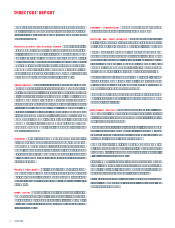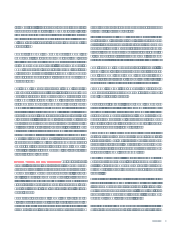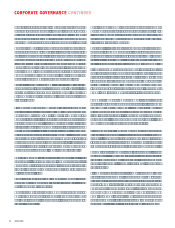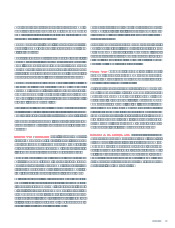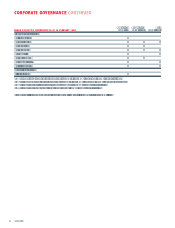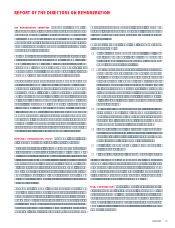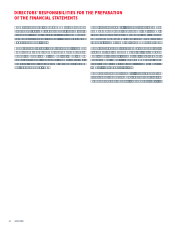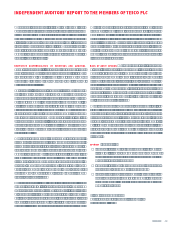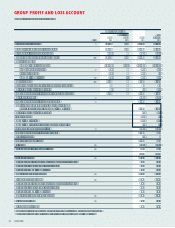Tesco 2004 Annual Report Download - page 18
Download and view the complete annual report
Please find page 18 of the 2004 Tesco annual report below. You can navigate through the pages in the report by either clicking on the pages listed below, or by using the keyword search tool below to find specific information within the annual report.only 25% of the award will vest for baseline performance.
The maximum 100% of the award will vest for outstanding
performance (ROCE improving to 11.5% over the next three years).
The Remuneration Committee believes that this combination
of robust annual EPS and ROCE targets, that are both challenging
and appropriate, provide a sound framework for aligning
executive interests with those of shareholders. The rebalanced
executive incentive arrangements will ensure continued emphasis
on strong annual performance combined with long-term
executive share ownership, with a better link between the
incentives received and shareholder value delivered.
SHARE OPTIONS Executive Directors are included in Executive
Share Option Schemes (ESOS). Executive options granted since
2000 may only be exercised subject to the achievement of EPS
growth of at least RPI plus 9% over three years.
The 1994 Executive Share Option Scheme and the 1994
International Executive Share Option Scheme are due to expire
during 2004. It is proposed that the two existing schemes and
the 1996 Tesco Unapproved Executive Share Option Scheme be
replaced with one new discretionary share option scheme. The
key features of the current share option schemes will be retained
and there will be no retesting of performance.
Share options are an important part of the incentive framework
for senior management of Tesco, and forthcoming accounting
changes are being fully evaluated. In the meantime, the
Committee considers the continuation of share option plans to
be in the best interests of shareholders.
SAYE Since 1981, the Group has operated an Inland Revenue
approved savings-related share option scheme for the beneÞt of
employees including Executive Directors.
Under this scheme, employees save on a four-weekly basis via
a bank/building society, with an option to buy shares in Tesco
PLC at the end of a three or Þve-year period, at a discount
of up to 20% of the market value. There are no performance
conditions attached to SAYE options.
SHARES IN SUCCESS Since March 2002 the Group has operated
a UK proÞt-sharing scheme (Shares in Success) for the beneÞt
of employees, including Executive Directors.The scheme is available
to employees with at least one years service at the Groups year
end. Shares in the company are allocated to participants in the
scheme on a pro-rata basis to base salary earned, up to Inland
Revenue approved limits (currently £3,000 per annum). The
amount of proÞt allocated to the scheme is determined by the
Board, taking account of company performance.
BAYE Since January 2002, the Group has operated the partnership
shares element of an Inland Revenue approved share investment
plan for the beneÞt of employees, including Executive Directors.
Under this scheme, employees save four-weekly to buy shares
at market value in Tesco PLC.
PENSIONS Executive Directors are members of the Tesco PLC
Pension Scheme which provides a pension of up to two-thirds
of base salary on retirement, normally at the age of 60,
dependent upon service. The scheme also provides for
dependants pensions and lump sums on death in service. The
scheme is a deÞned beneÞt pension scheme, which is approved
by the Inland Revenue.
SERVICE AGREEMENTS In response to shareholder feedback and
in line with best practice, the Committee has reviewed Executive
Director Service Agreements.
It is proposed that Sir Terry Leahy, Mr P A Clarke, Mr A T
Higginson, Mr T J R Mason and Mr D T Potts will have new
service agreements with entitlement to notice of 12 months by
the company and six months notice by the Executive. Mr R W
P Brasher, who was appointed on 15 March 2004 has the same
service agreement.
If an Executive Directors employment is terminated (other than
pursuant to the notice provisions in the service agreement or
by reason of resignation or unacceptable performance or
conduct) the company will pay, by way of liquidated damages,
a sum equal to one years salary and one years average annual
bonus (calculated as the average of the two most recent Þnancial
years). The termination payment is subject to the Executive
Director entering into restrictive covenants, to apply for a six-
month period after such termination, so as to protect the
goodwill of the business.
The company will apply mitigation to termination payments,
whilst reßecting its policy of rewarding loyalty and recognising
long service. Payments will cease on the date the Executive
Director starts alternative employment.
If the termination occurs within one year of retirement, the
termination payment would be reduced accordingly.
The Committee has agreed that, in future, new appointments
of Executive Directors will normally be on a notice period of
12 months.The Committee reserves the right to vary this period
to 24 months for the initial period of appointment and for the
notice period to then revert to 12 months.
16 TESCO PLC
REPORT OF THE DIRECTORS ON REMUNERATION CONTINUED


